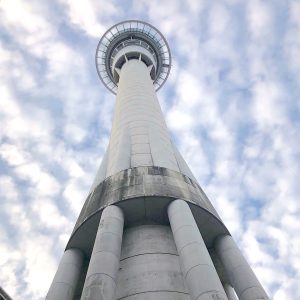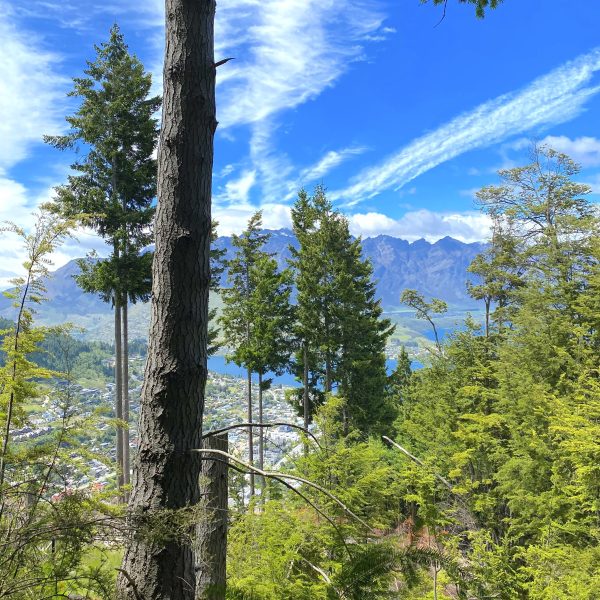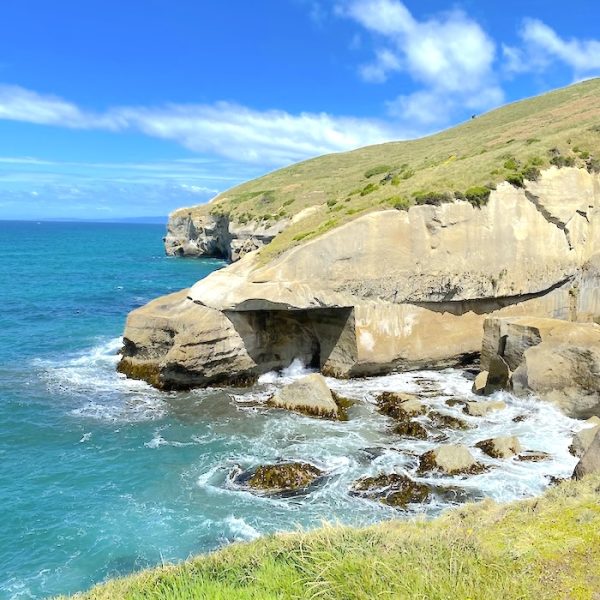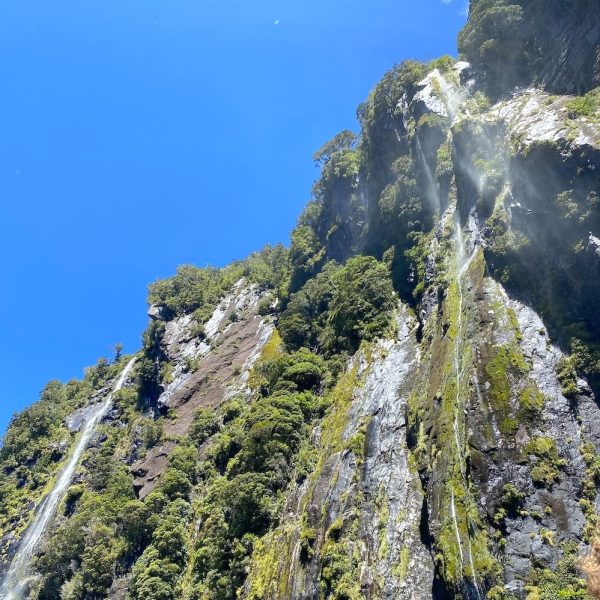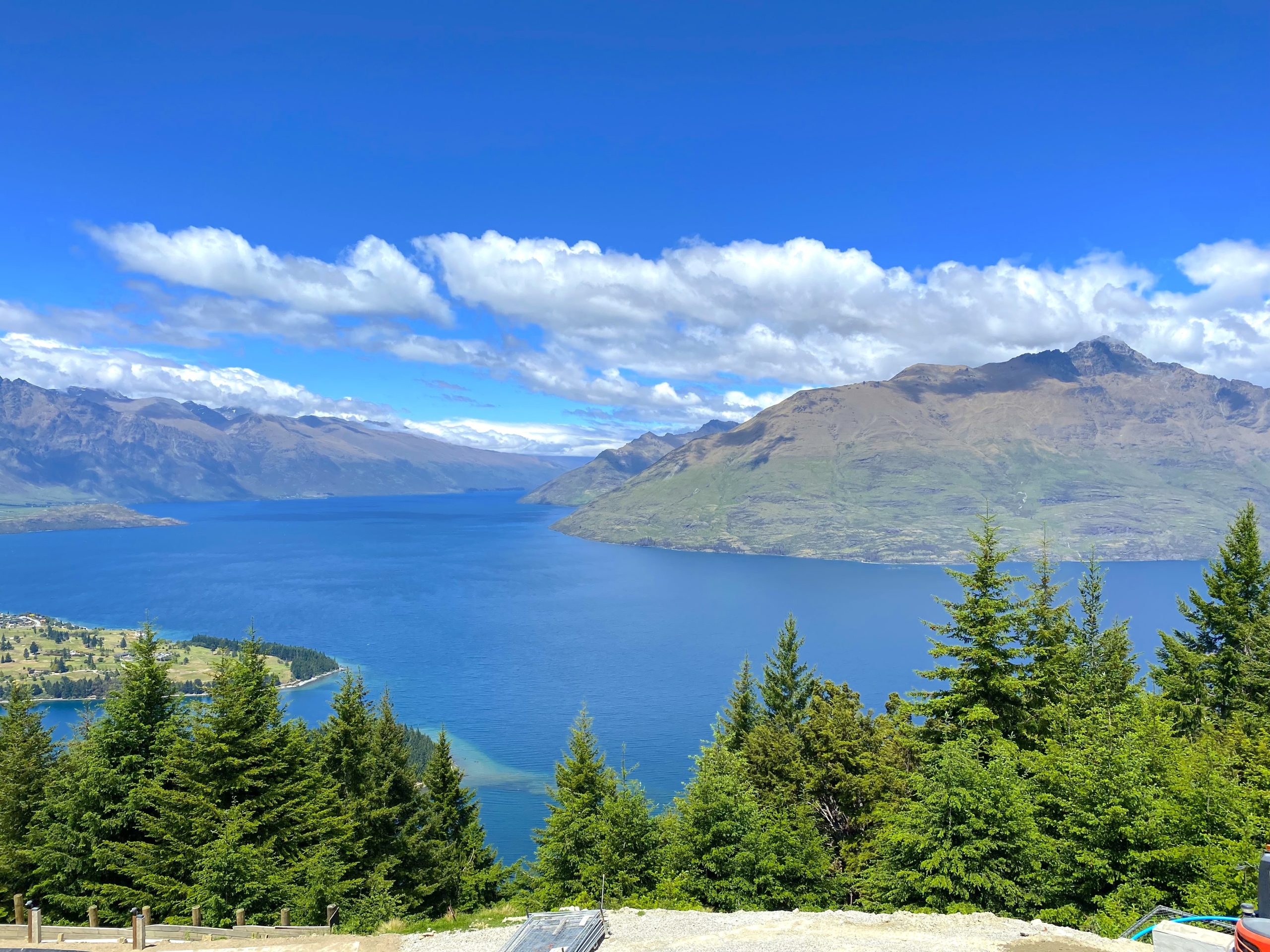
What to Expect in New Zealand
- Capital City
Surprise! It’s not Auckland (shocking, I know). Wellington takes the crown and sits proudly on the North Island. - Money
The local currency is the New Zealand Dollar (NZD). While cards are widely accepted, don’t rely too much on Apple Pay or PayPass – they’re not a sure thing everywhere. Pro tip: always have a physical card on hand, just in case. - Plugs
New Zealand uses Type I plugs – same as Australia. If you’re an Aussie, you’re in luck! No need to fuss about adaptors. - Time Zone
New Zealand runs on GMT+13. So, if you’re calling mates back home, remember the time difference – don’t be that person waking them up at 3 a.m. - Climate
It’s generally chilly vibes here. Since New Zealand’s in the Southern Hemisphere, the seasons flip:- Summer (Dec-Feb): Expect a comfy 20-25°C – perfect for beach trips and hikes.
- Winter (June-Aug): Temps max out around 12-16°C. The South Island is a snow lover’s dream, so pack warm if you’re heading that way!
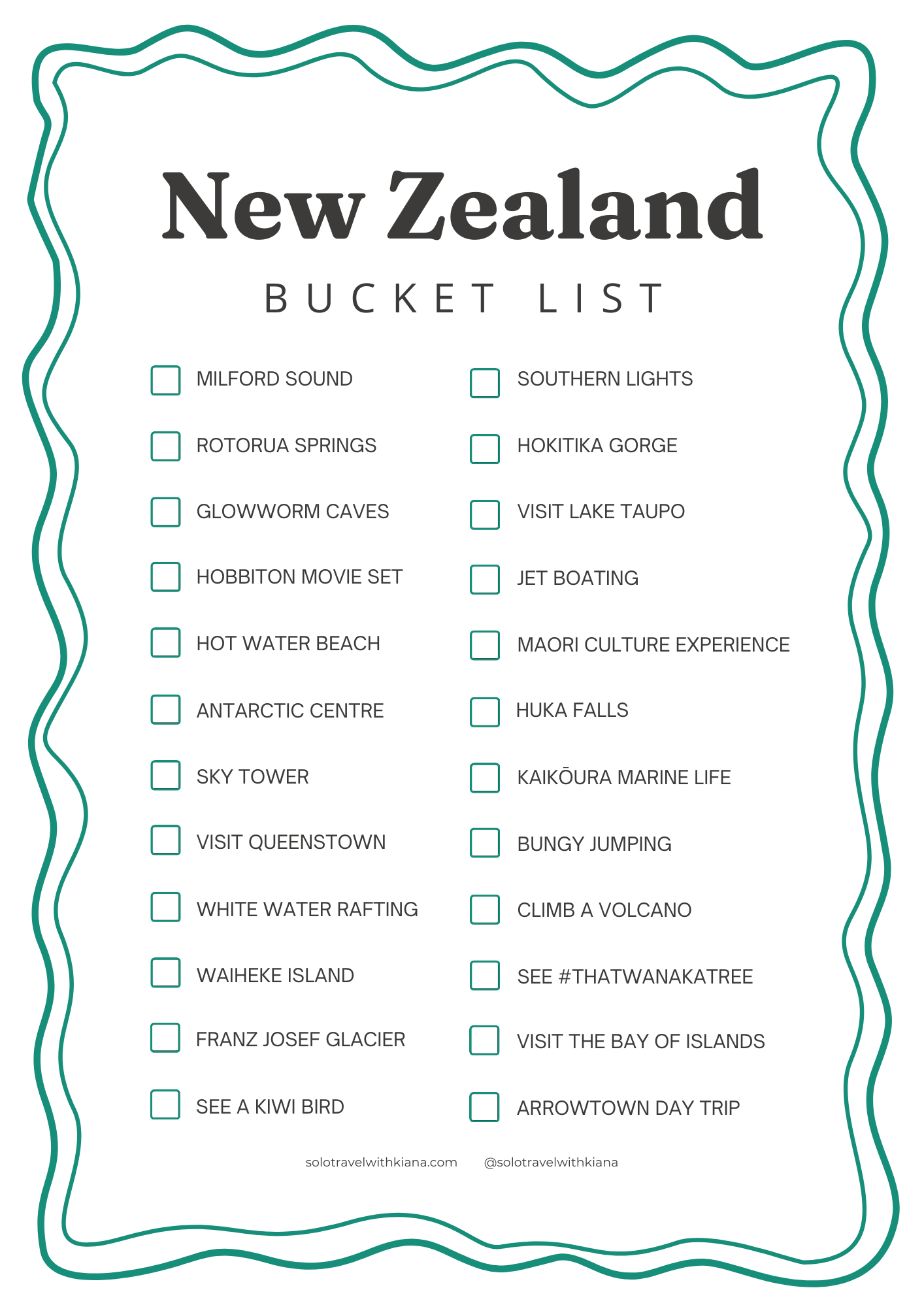
Bucket List Experiences
What It’ll Cost You
New Zealand isn’t exactly a backpacker’s dream when it comes to prices – but don’t let that scare you off. With some smart planning, it can totally be done on a budget. During my trip, I stuck to hostels, bought groceries instead of eating out, and used public transport wherever I could. If you’re traveling like this, I’d suggest budgeting around $100 NZD per day.
Here’s a breakdown of common costs to help you plan:
| Expense | Cost Range (NZD) | Notes |
| Hostel Dorm Bed | $30–$50 per night | Prices vary depending on location and season. Check Hostelworld for reviews and deals. |
| Budget Hotel | $90–$150 per night | A step up from hostels, but still affordable if you’re splitting costs with a friend. |
| Groceries | $50–$80 per week | This will cover simple meals – cooking at the hostel kitchen is a game-changer. |
| Eating Out | $15–$25 per meal | Cafes and casual spots are reasonably priced; fancy dining will set you back much more. |
| Public Transport | $3–$5 per trip or $20–$30 for a day pass | Buses are your best bet in cities; intercity buses like InterCity are also affordable. |
| Car Rental | $60–$120 per day | Ideal for road trips, especially in the South Island. Fuel costs extra. |
| Activities | $50–$300+ | Depends on what you’re doing. A glowworm cave tour might cost $60, while skydiving is $$$. |
| Sim Card/Data | $30–$50 | Includes a few GB of data for 30 days – handy for maps and staying connected. |
| Coffee | $4–$6 | Flat whites are a Kiwi specialty, and worth every cent. |
| Beer or Wine | $8–$12 per drink | Bars are fun, but buying from a bottle shop and chilling by the lake is cheaper. |
Pro Tip: If you’re doing a lot of activities, look into combo deals or discount passes. Every little bit helps!
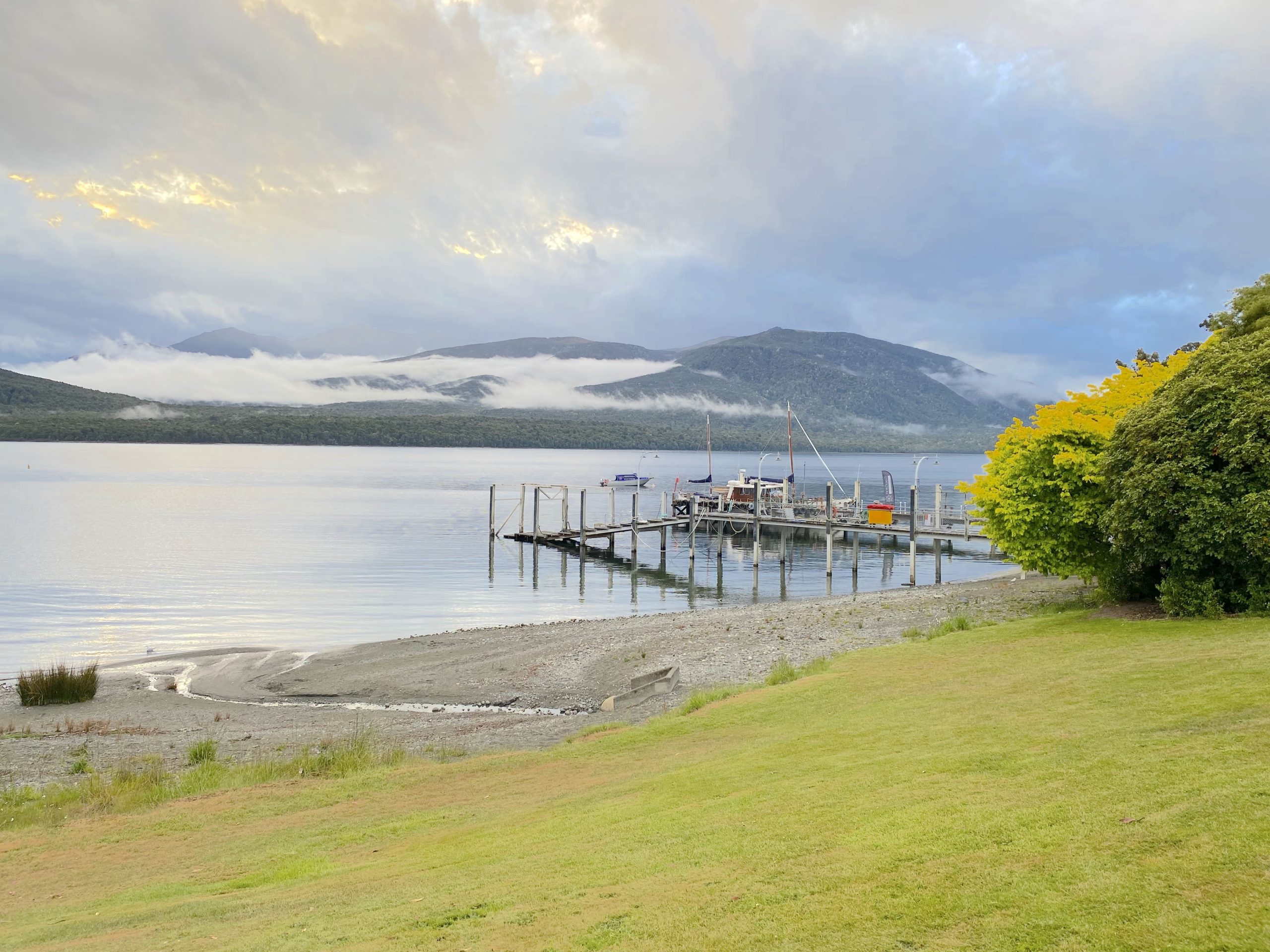
Getting Around
New Zealand might be small, but getting around can feel like a bit of an adventure in itself. Whether you’re catching buses, renting a car, or living the van life dream, here are your main options:
- InterCity Buses
If you’re not hiring a car, InterCity buses are hands down the easiest and cheapest way to travel between towns. I used them a lot, and they were super simple – most of the time, you don’t even need to show your ticket; they just check your name on a list. (Still, keep a digital copy just in case.) Bonus? Outside peak season, the buses are often pretty empty, so you might get the whole seat to yourself. Other times, you’ll end up chatting with fellow travellers – perfect for trading tips or just sharing stories. - Kiwi Experience
I didn’t use Kiwi Experience myself, but it’s another popular bus option, especially for young travellers looking for a more social vibe. It’s pricier than Intercity and runs differently – think more of a hop-on-hop-off backpacker tour than just transport. If you’re keen to meet people and don’t mind spending a little extra, this could be for you! - Van Life
Living the van life in New Zealand is iconic. Whether you buy a van for a long-term trip and sell it at the end or rent one for a shorter adventure, it’s a flexible (and Instagram-worthy) way to explore. Jucy vans are everywhere – you can’t miss their purple-and-green fleet. The prices vary a lot based on the time of year and van features, but expect around $350 per day for a standard two-person camper like “The Crib.” It comes with foldable seats that turn into a bed, a mini fridge, a water tank, and even unlimited kilometres. It’s not cheap, but it’s an unforgettable way to see the country at your own pace. - Car Rental
If vans aren’t your thing but you still want the flexibility of driving, renting a car is a great option. It’s definitely more expensive than buses, but you’ll get the freedom to go off the beaten track. Standard rental companies like Budget, Hertz, and Avis have cars starting at around $50–$100 per day, but local companies can sometimes be cheaper. - Rental Relocation
Here’s a sneaky budget hack: rental relocation. Some companies offer vehicles for as little as $1 a day if you’re willing to drive them from one location to another. The catch? You’ll usually have a tight timeframe and a set route. But if your plans line up, it’s a super cheap way to get around! Check out sites like Imoova or Omega Relocation for deals.
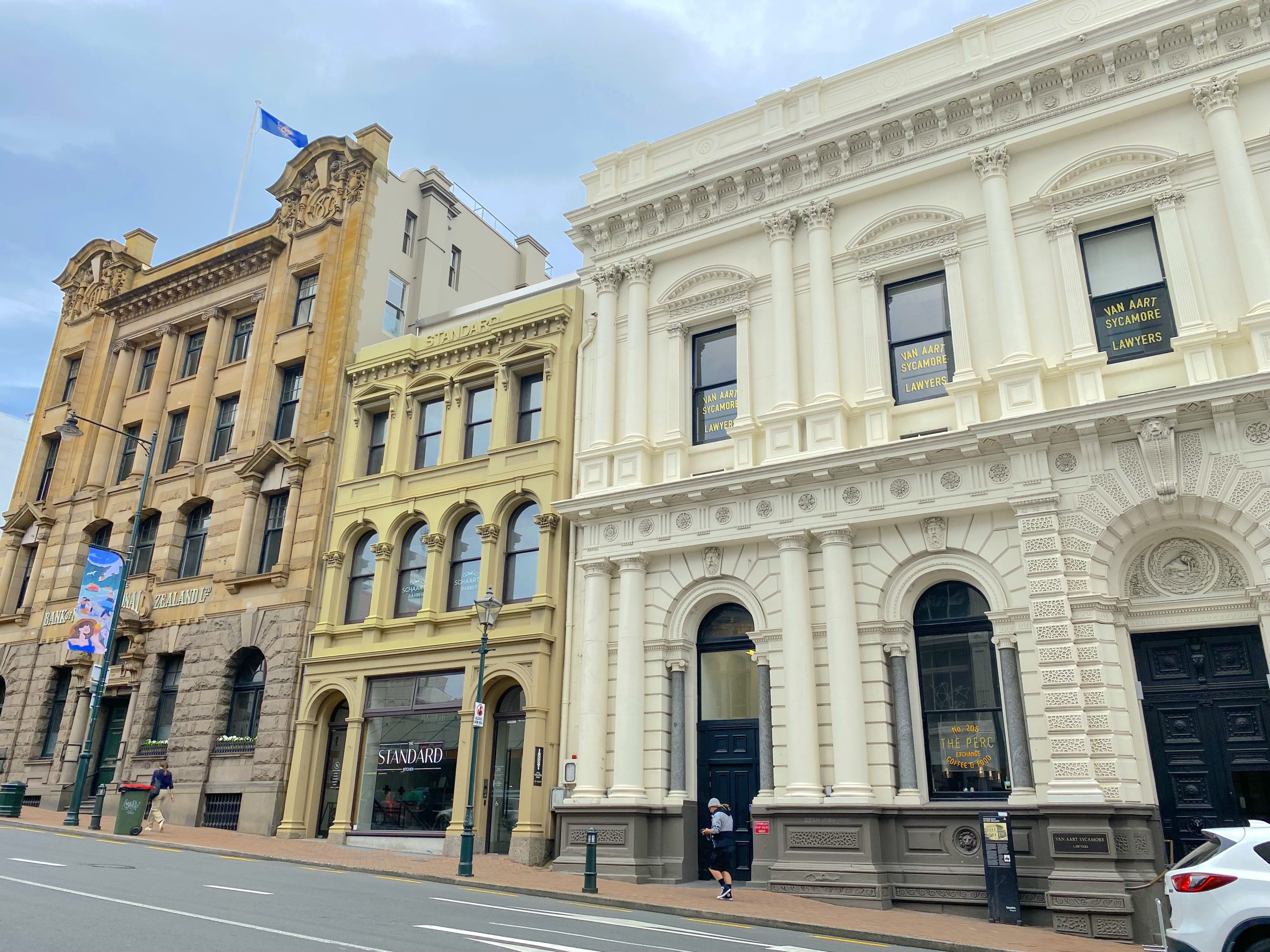
Staying Safe in New Zealand
New Zealand is one of the safest places to travel solo—especially as a woman—but that doesn’t mean you should throw caution to the wind. Common sense is your best travel buddy (well, besides Google Maps).
- Emergency Number
If things go pear-shaped, dial 111 for police, fire, or medical emergencies. Easy to remember, but maybe save it in your phone just in case your brain decides to blank under pressure. - General Safety
New Zealand’s vibe is super chill, but don’t get too relaxed:- Lock your accommodation and vehicles. Even in the middle of nowhere, better safe than sorry.
- Don’t leave valuables in cars unless you’re really keen to part with them.
- Keep an eye on your stuff in public—NZ might be safe, but thieves exist everywhere (and they love a free backpack).
- At night, stick to well-lit areas with people around. If your gut tells you something’s off, trust it—it’s smarter than you think.
- Medical Care
Got an Aussie passport? Congrats, you’re in luck! Thanks to the reciprocal healthcare agreement, you can access public health care in NZ for free or at reduced costs.- Everyone, tourists included, is covered by the ACC (Accident Compensation Corporation) for injuries. Whether you trip over your own feet or slip on a hiking trail, ACC has your back (literally). There might be a small fee, though.
- Still, travel insurance is a must. Think of it as your financial safety net for medical bills, lost luggage, or that time you accidentally booked a tour on the wrong date.
- Natural Disasters
Look, it’s not likely you’ll experience an earthquake or tsunami while you’re here, but it’s good to be prepared. Brush up on what to do during an earthquake (hint: “Drop, Cover, Hold” is not a new TikTok dance), and if you’re in a coastal area, pay attention to tsunami evacuation signs. - Driving in New Zealand
Planning to hit the road? Here’s what you need to know:- Kiwi drivers are some of the nicest around. Seriously, compared to Aussie roads, it’s like everyone’s on their best behaviour.
- Some road signs are different—like the give-way sign—so take a minute to familiarize yourself with them to avoid awkward moments at roundabouts.
- You can use an overseas license for 12–18 months, but if it’s not in English, you’ll need an official translation or an International Driving Permit (IDP).
- Road trips here are amazing, but remember: no phone maps while driving. Unless you enjoy surprise chats with the police.
- Drinking Laws
The legal drinking age is 18, and you’ll need valid ID to prove it. Acceptable forms include:- Your passport
- A Kiwi Access Card
- A New Zealand driver’s license
Australian (or other international) driver’s licenses? Nope, not accepted. So, leave your license for car hire and bring your passport if you’re hitting the bars.
- Solo Travel Tips
- New Zealand is a dream for solo female travellers. Hostels are super social, so if you want to make friends, it’s easy. Or, if you prefer your own company, no one will bat an eye.
- Share your plans with someone back home, especially if you’re heading off-grid.
- And honestly, just trust your gut. It’s like having your own built-in safety radar.
New Zealand is the kind of place where you can explore, relax, and generally feel pretty safe. Keep your wits about you, follow the basics, and you’ll have an epic adventure.
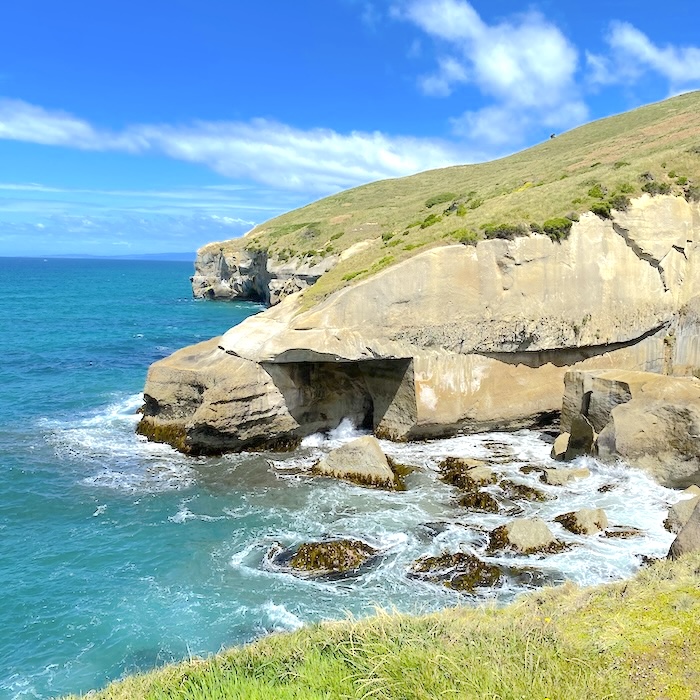
Where to Stay in Queenstown (If You’re Broke But Still Want Nice Views)
Where to Stay in Queenstown (If You’re Broke But Still Want Nice Views) Queenstown Accommodation…
Tunnel Beach, Dunedin: How to Visit This Hidden Gem
Tunnel Beach, Dunedin: How to Visit This Hidden Gem Tunnel Beach is hands down one…
Milford Sound: Everything You Need to Know Before Visiting
Milford Sound: Everything You Need to Know Before Visiting What is Milford Sound? First off,…







